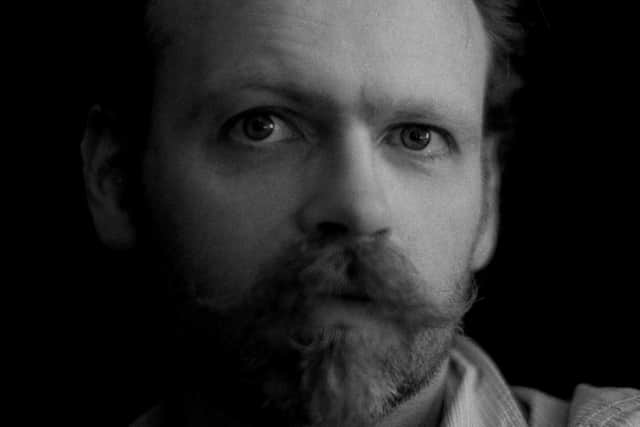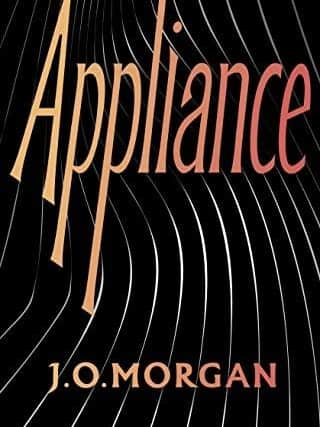Book review: Appliance, by JO Morgan


Although JO Morgan has had a great deal of success as a poet, this is his first novel by a major publisher. A question that might flit across the brain is “Is this a novel?” It has 11 chapters, in prose, and a narrative that begins and ends. But in each section we have different protagonists, and there is only one constant: a machine. In terms of plot arc, forget about the fleeting humans because the real story is about how the technology is changing, adapting, morphing, growing and in its own way distorting us. It is the Bindungsroman of something inhuman, and it is terrifying.
It begins by wrong-footing the reader. Instead of a science-fiction set-up, we arrive in a dreary and weary suburban scene. The style chimed with various dramatic works I love – the early Pinter of The Birthday Party, Ayckbourn’s Absurd Person Singular or N F Simpson’s One Way Pendulum. In Morgan’s case it is the pompous Mr Pearson and his tetchy wife Mrs Pearson – neither of whom have forenames – and the arrival of the appliance. Mr Pearson works in Personnel and is delighted to have been chosen to trial the new thing. It unsettles, confuses and bemuses them both; and the reader is drawn in to wondering what the contraption is, and what it does. Their relationship is sketched with acid precision: he is blusteringly confident, she is taciturn and subversive. The denouement comes, and it a masterpiece of bathos; in that a plastic spoon that wasn’t in the machine now is in the machine. And then it has gone again. The company Mr Pearson drudges for seems to be on the verge of creating a device that can (not instantaneously, at this stage), transport matter. That he works in Personnel is a very knowing touch. “Human Resources” might have been too blatant, but the human and the non-human have had their first collision.
Advertisement
Hide AdAs the book progresses we get snapshots of lives as the technology advances, from the first human trial subject, to the man who devised the transporter wondering how much else it might do, to the journalist who thinks the system may be concealing a flaw, to the schoolboy who finds the error in the code, to much (and comical, and horrible) embarrassment. The idea of the philosophical novel is often seen as pretentious, and Morgan’s skill is that in each brief vignette we come to have an affective relationship with those dealing with this paradigm shift in human behaviour and interaction. Some are truly shocking, some are absurdly tender. All of them, as if the reader were in an opticians, take different lenses to the eye and asks, “Better or worse?”


The idea of perfect replication is not new, nor are the philosophical problems surrounding it. One chapter has an elderly woman transporting her belongings to a new home and poses a fundamental question: is what arrives what was sent, or a copy (the word “mere” becomes difficult) of it? I remembered going to see the “cleaned” version of Carlo Crivelli’s Annunciation half a life ago and wondering even then if stripping away the accretions of age, despite how glorious the gold now was, was taking a form of disinfectant to history. Maybe the dust and candle-smoke and ingrained-ness were actually part of what it now was. This is not a new or original thought. Walter Benjamin fretted about it in “The Work of Art in the Age of Mechanical Reproduction”, Star Trek’s Dr McCoy was famously wary about using a transporter, and numerous plots involved the implication of taking something apart and putting it back together. China Miéville’s Kraken has an extended riff on a character who has a transporter and hadn’t realised that the subject is disintegrated (i.e. killed) then reconstituted, and is therefore haunted by the ghosts of his former selves.
Morgan’s real skill is in finding the poetry of the conundrum – he nearly sidesteps the science-y bits with an eerie meeting with someone who knows more than they let on: the problem is not that it works, the problem is that it doesn’t not work. An Egyptian could construct a right angled triangle with 12 knots on a rope, but it needs a Pythagoras to realise that the square of the hypotenuse is equal to the squares of the opposite two sides.
Morgan insists in this fable-like, compelling novel on the groundedness of being, of the reality of the here being here and the now being now. Although an air of elegy permeates the book, there is a sense of resilient triumph: humanity, encroached on by its own ingenuity, persists. At the end one character says, in relation to acceleration of development: “Why’d they want do a thing like that?” and the reply comes “Just saying as they could”. It’s the “because it’s there” argument for mountain climbing or reaching the magnetic south. Maybe, Morgan suggests, just let it be. We are too intrusive on reality.
Appliance, by JO Morgan, Jonathan Cape, £16.99.